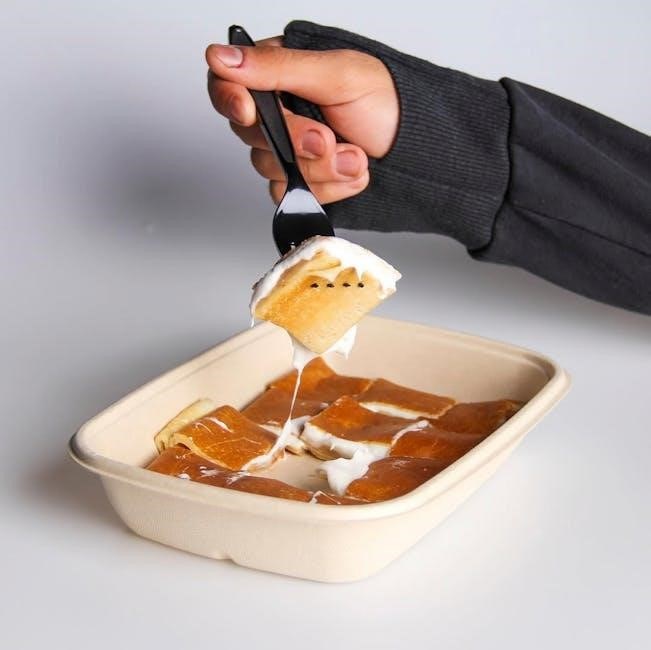Cadette Eating for You Badge Requirements
To earn the Cadette Eating for You badge, Girl Scouts must complete five steps, understanding how nutrition impacts their mood, mind, and body. This includes exploring the effects of food on skin, stress, sleep, and energy levels, ensuring a holistic approach to healthy eating habits.

Overview of the Eating for You Badge
The Cadette Eating for You badge is designed to empower Girl Scouts to make informed choices about nutrition and understand the connection between food and overall well-being. This badge encourages Cadettes to explore how their diet affects not only their physical health but also their mental and emotional states. It moves beyond simply understanding basic nutritional guidelines to investigating the specific ways that food impacts energy levels, sleep patterns, stress management, and even skin health.
Through a series of engaging activities, Cadettes will learn to identify healthy foods, analyze their own eating habits, and make positive changes to their diet. They will gain a deeper appreciation for the role of nutrition in maintaining a healthy lifestyle and develop skills that will serve them well throughout their lives. The badge emphasizes practical application, encouraging girls to experiment with new recipes, track their food intake, and observe the effects of different foods on their bodies.
Ultimately, the Eating for You badge aims to equip Cadettes with the knowledge and confidence to make healthy eating choices that support their physical and mental well-being, fostering a lifelong commitment to a balanced and nutritious diet.
Requirement 1: Understanding Good Nutrition
The first requirement of the Cadette Eating for You badge focuses on building a foundational understanding of good nutrition and how it benefits the body. Cadettes will explore the essential components of a balanced diet, including macronutrients like carbohydrates, proteins, and fats, as well as micronutrients such as vitamins and minerals; They will learn about the role each nutrient plays in supporting overall health and well-being.
To fulfill this requirement, Cadettes can engage in activities like tracking their daily food intake and analyzing it based on recommended dietary guidelines. They might also research the food pyramid or MyPlate to understand portion sizes and the importance of incorporating a variety of foods into their diet. Another option involves exploring the different food groups and identifying healthy choices within each group.
This requirement aims to empower Cadettes to make informed decisions about their food choices by providing them with the knowledge they need to understand the nutritional value of different foods. By learning about good nutrition, they can begin to develop healthy eating habits that will support their growth, energy levels, and overall health;
Activities for Learning About Nutrition
To effectively learn about nutrition, Cadettes can participate in several engaging activities. One option is “Eat by Color,” where they track their daily intake from the food pyramid’s color groups, analyzing serving quantities. Another activity involves keeping a food log to monitor eating habits, identifying areas for improvement. Cadettes can also “Make Your Own Plate,” planning balanced meals using dietary guidelines;
Furthermore, they can research and present on specific nutrients, detailing their benefits and sources. Creating a visual chart comparing healthy and unhealthy food choices is another helpful activity. Holding a taste test of various healthy snacks encourages exploration of nutritious options. Additionally, Cadettes could interview a nutritionist or dietitian to gain expert insights.
These activities aim to make learning about nutrition interactive and enjoyable, enabling Cadettes to understand the importance of a balanced diet. By actively participating, they are more likely to retain information and apply it to their own eating habits, fostering a lifelong commitment to healthy living.

Requirement 2: Food’s Impact on Skin
This requirement focuses on understanding the connection between diet and skin health. Cadettes explore how specific foods and nutrients affect skin appearance and overall health. They investigate the role of hydration, vitamins, and minerals in maintaining healthy skin, identifying foods rich in these essential elements. They’ll research how processed foods, sugary drinks, and unhealthy fats can negatively impact skin, leading to breakouts, dryness, and premature aging.
Cadettes can also conduct a “skin-food experiment,” tracking their diet and observing any changes in their skin over a set period. They can research skin conditions like acne, eczema, and psoriasis, learning how dietary choices may influence these conditions. Discussing common myths about food and skin, debunking misinformation with scientific facts, is also beneficial.
By completing this requirement, Cadettes learn to make informed choices about their diet, promoting healthy and radiant skin. Understanding the link between food and skin empowers them to take better care of their bodies and make conscious decisions about what they consume.

Exploring the Connection Between Diet and Skin Health
Delving into the intricate relationship between diet and skin health, Cadettes will uncover how their food choices directly influence the appearance and well-being of their skin. This exploration involves understanding the role of essential nutrients, such as vitamins, minerals, and antioxidants, in maintaining healthy skin function. They’ll learn how these nutrients contribute to collagen production, hydration, and protection against environmental damage.
Cadettes will also investigate the negative impacts of certain foods on skin health, including processed foods, sugary drinks, and unhealthy fats. They’ll discover how these dietary choices can contribute to inflammation, breakouts, and premature aging. Researching specific skin conditions, like acne and eczema, and their potential links to dietary factors will further enhance their understanding.
Furthermore, Cadettes can analyze food labels to identify ingredients that promote or hinder skin health. They can also experiment with incorporating skin-healthy foods into their daily meals and snacks, observing any positive changes in their complexion. By gaining this knowledge, Cadettes can make informed dietary choices that support healthy, radiant skin from the inside out.
Requirement 3: Diet and Stress Levels
This requirement challenges Cadettes to explore the profound influence of diet on stress levels. They’ll investigate how certain foods can either exacerbate or alleviate feelings of anxiety and tension. Understanding the physiological mechanisms involved, such as the role of cortisol and neurotransmitters, is crucial.
Cadettes will delve into the impact of processed foods, sugary snacks, and caffeine on stress responses. They will learn how these substances can trigger fluctuations in blood sugar levels, leading to irritability and mood swings. Conversely, they will discover the benefits of incorporating stress-reducing foods into their diet, such as fruits, vegetables, whole grains, and lean proteins. These foods provide essential nutrients that support the nervous system and promote relaxation.
Furthermore, Cadettes can conduct research on the connection between gut health and stress. They will learn how a balanced gut microbiome can positively influence mood and reduce anxiety. Exploring mindfulness techniques and mindful eating practices will also help Cadettes develop a healthier relationship with food and manage stress effectively. This knowledge empowers them to make conscious dietary choices that support their overall well-being and resilience to stress.
Investigating Food Additives and Stress
This section focuses on exploring the potential link between food additives and stress levels in the body. Cadettes will investigate how certain artificial ingredients, preservatives, and chemicals commonly found in processed foods may contribute to feelings of anxiety, restlessness, and overall stress.
The investigation involves researching common food additives like artificial sweeteners (aspartame, sucralose), artificial colors (Red 40, Yellow 5), and preservatives (sodium benzoate, BHT). Cadettes will examine studies and articles that discuss the potential negative impacts of these additives on the nervous system and hormonal balance. They’ll learn how these substances might disrupt normal brain function and contribute to heightened stress responses.
As part of their research, Cadettes can analyze food labels to identify products high in these additives. They can conduct experiments, such as eliminating certain additives from their diet for a week, to observe any changes in their stress levels and overall well-being. This hands-on approach will help them understand the potential impact of food additives on their bodies and empower them to make informed choices about the foods they consume, ultimately promoting better stress management.
Requirement 4: Food’s Influence on Sleep
This requirement delves into the intricate relationship between dietary choices and sleep quality. Cadettes will explore how different foods and drinks can either promote restful sleep or disrupt sleep patterns, leading to insomnia or restless nights. The goal is to understand how to make informed food choices to improve sleep hygiene.
Cadettes will investigate specific foods and beverages known to affect sleep, such as those containing caffeine, sugar, and alcohol. They will learn how caffeine, a stimulant found in coffee, tea, and energy drinks, can interfere with the body’s natural sleep-wake cycle. Similarly, they’ll discover how sugary foods can cause blood sugar spikes and crashes, disrupting sleep throughout the night. The impact of alcohol, a depressant that can initially induce drowsiness but later disrupt sleep architecture, will also be examined.
Furthermore, Cadettes will explore foods that promote sleep, such as those rich in tryptophan (turkey, nuts), magnesium (leafy greens, avocados), and melatonin (cherries, bananas). They can track their own food intake and sleep patterns to identify correlations between their diet and sleep quality, fostering awareness of the power of food to influence rest.
Foods and Drinks for Better Sleep
Optimizing sleep through dietary choices involves incorporating foods and drinks that naturally promote relaxation and regulate sleep cycles. Certain nutrients and compounds found in specific foods can aid in the production of sleep-inducing hormones and neurotransmitters, leading to improved sleep quality.
Foods rich in tryptophan, an amino acid, are beneficial as tryptophan is a precursor to serotonin and melatonin, both crucial for sleep regulation. Turkey, nuts, and seeds are excellent sources. Magnesium-rich foods, such as leafy green vegetables, avocados, and bananas, help relax muscles and calm the nervous system, promoting a sense of tranquility before bedtime. Calcium, found in dairy products like milk and yogurt, also aids in melatonin production.
Drinks like chamomile tea and warm milk have long been associated with relaxation and sleep. Chamomile contains apigenin, an antioxidant that binds to brain receptors and may decrease anxiety and initiate sleep. Avoiding caffeine and alcohol before bed is crucial, as these substances can disrupt sleep patterns. Small adjustments in dietary habits can significantly improve sleep, contributing to overall well-being.
Requirement 5: Diet and Energy Levels
Exploring the connection between diet and energy levels is crucial for understanding how food fuels our bodies and minds. The foods we consume directly impact our energy levels throughout the day. A balanced diet provides sustained energy, while poor dietary choices can lead to energy crashes and fatigue.

Complex carbohydrates, found in whole grains, fruits, and vegetables, are a primary source of sustained energy. These carbohydrates are digested slowly, providing a steady release of glucose into the bloodstream. Proteins are also essential, helping to stabilize blood sugar levels and support muscle function, contributing to overall energy. Healthy fats, like those found in avocados and nuts, provide long-lasting energy and support hormone production.
Avoiding processed foods, sugary drinks, and excessive caffeine is important, as these can cause rapid spikes and drops in energy. Staying hydrated by drinking plenty of water is also vital for maintaining energy levels. Experimenting with different food combinations and paying attention to how they affect your energy can help you create a personalized diet that supports optimal performance throughout the day.
Exploring Foods That Boost Energy
To effectively manage energy levels, understanding which foods provide sustained energy is essential. Foods rich in complex carbohydrates, such as oats, quinoa, and brown rice, are excellent sources of long-lasting energy. These carbohydrates are digested slowly, providing a steady stream of glucose to the body, preventing energy crashes.
Protein-rich foods, including lean meats, eggs, and legumes, also play a crucial role in energy management. Protein helps stabilize blood sugar levels and supports muscle function, which is vital for sustained physical activity. Incorporating healthy fats, such as avocados, nuts, and seeds, into your diet provides a slow-burning source of energy, supporting hormone production and overall well-being.
Fruits and vegetables are packed with vitamins, minerals, and antioxidants that contribute to energy production and overall health. Berries, spinach, and bananas are particularly beneficial for boosting energy levels. Avoiding processed foods, sugary drinks, and excessive caffeine is crucial, as these can lead to energy slumps. Staying hydrated by drinking plenty of water is also vital for maintaining optimal energy levels throughout the day.
Virtual Meeting Adaptations for the Badge
Adapting the Cadette Eating for You badge for virtual meetings requires creative strategies to engage Girl Scouts remotely. For the “Understanding Good Nutrition” requirement, interactive online quizzes and virtual food label reading sessions can be used. Girls can share their meal plans and discuss the nutritional value of different foods, fostering a collaborative learning environment.
To address the “Food’s Impact on Skin” component, online presentations featuring dermatologists or nutritionists can be arranged. Girls can participate in virtual discussions about skincare routines and the effects of various foods on skin health. For the “Diet and Stress Levels” section, guided meditation sessions and virtual workshops on stress-reducing foods can be organized.
The “Food’s Influence on Sleep” requirement can be tackled through online sleep hygiene presentations and discussions on sleep-promoting foods. Girls can track their sleep patterns and share their experiences in virtual group settings. Lastly, for “Diet and Energy Levels,” virtual cooking demonstrations showcasing energy-boosting recipes can be conducted. Girls can prepare these recipes at home and share their experiences during the meeting, ensuring practical application of the badge requirements.
Badge Purpose and Learning Outcomes
The Cadette Eating for You badge is designed to empower Girl Scouts with the knowledge and skills to make informed food choices, fostering a healthy relationship with food and their bodies. The primary purpose of this badge is to educate Cadettes on how nutrition impacts various aspects of their well-being, including mood, energy levels, skin health, sleep quality, and stress management;
Upon completion of the badge requirements, Cadettes will be able to identify essential nutrients and understand their roles in maintaining overall health. They will learn to analyze food labels, make healthy meal choices, and recognize the connection between diet and skin conditions. Furthermore, they will explore how certain foods can influence stress levels and develop strategies for incorporating stress-reducing foods into their diets.
Cadettes will also gain insights into the relationship between food and sleep, identifying foods and drinks that promote better sleep habits. Finally, they will learn about energy-boosting foods and create meal plans to sustain energy throughout the day. Ultimately, the badge aims to equip Cadettes with the tools to cultivate a healthy lifestyle through mindful eating practices.
